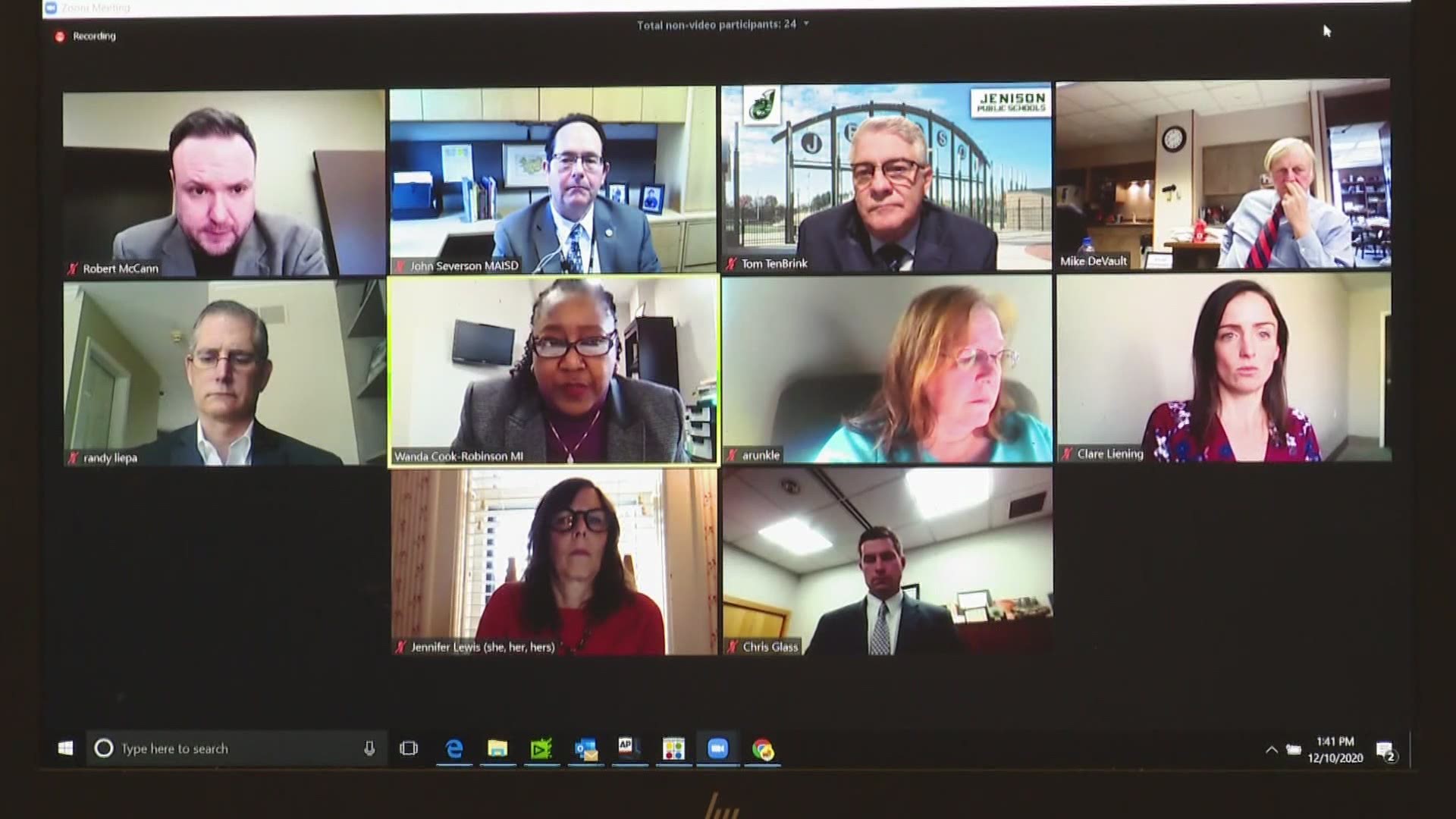MUSKEGON, Mich — During a “State of Michigan Schools” roundtable via Zoom, superintendents and education leaders from across the state outlined a need for short and long-term K-12 funding commitments from the state and federal government.
“Immediate and direct funding for K-12 schools must be at the forefront of ongoing discussions in Washington,” said Wayne RESA Superintendent Dr. Randy Liepa. "Schools will require significant resources to maintain current programming and begin the process of recovering from the inevitable loss of learning our students are experiencing during this pandemic."
Many districts are offering students two to three learning models, taking on additional expenses to provide safe learning environments. Budgets are a big concern for school administrators, however, significant learning loss caused by the pandemic also weighs heavily on their minds.
"We will need significant federal assistance from Washington in order to support students moving forward," said professor in Wayne State University’s College of Education Dr. Jennifer Lewis. "There's great loss, probably five to nine months of learning loss due to the pandemic. Kids will have basically lost a year of academic learning."
“The devastating impact of COVID-19 on our economy and our families will have long lasting effects. We must support our businesses and schools through resources that address learning loss and career development,” said Macomb ISD Superintendent Michael DeVault. “Schools are actively preparing to offer students the academic remediation and other support that will be needed over the next several years—at minimum—to get them back on track.”
Muskegon Area Intermediate School District Superintendent John Severson believes the learning loss will be even greater with the estimated 53,000 students in Michigan who aren't participating in any of the learning models offered by their local school district.
"I think it's so critical that we recognize the lost voices, the families in poverty and in those areas in the state where wireless connections don't work very well," said Severson. "We know face to face will always be the best way to deliver instruction and when we get back to that place we have to be incredibly strong with resources, the finances, and the people to get this job done."
"The learning gap is growing between segments of our students, learning gaps we all had to work with but those learning gaps are growing significantly in this environment," said Jenison Public Schools Superintendent Tom TenBrink. "What we are going to need moving forward is people and we can't build budgets and hire people on short-term dollars."
When the first stimulus package was issued in March, schools waited months to receive their funding because the process relied heavily on the legislature’s ability to agree on how to allocate spending—a delay educators say can’t be afforded this school year.
“Direct aid to schools is critical, rather than relying on state legislatures to allocate funding,” said Oakland Schools Superintendent Dr. Wanda Cook-Robinson, “In funding schools directly, legislators can both ensure funding reaches its intended destination and take partisan politics out of the equation. We simply can’t afford to allow politics to impact our ability to give our students the help they need today and will need for years to come as a result of the pandemic.”
The education leaders participating in the Zoom discussion called for funding from Lansing and encouraged state legislators to support the call for Congressional action.
“State lawmakers must commit to a budgeting process going forward that recognizes schools won’t return to ‘business as usual’ for years to come, and our budgets shouldn’t either,” said Severson. “We need real, direct investments in our schools and our students, which will result in getting our state back on track long-term.”
A November 2020 study by NWEA MAP of 4.4 million students nationwide found that in fall of 2020, students in grades 3–8 performed similarly in reading to same-grade students in fall 2019, but about five to 10 percentile points lower in math.
The organization compared the scores of students in schools that gave the tests in both fall 2019 and fall 2020. However, 25% of those students, predominantly low-income African American and Hispanic students, didn’t take the tests this fall.
“The data we’re seeing tells us that we are far from understanding the significant learning loss that will result from the pandemic, and we’re not likely to have reliable test scores anytime this year,” said St. Clair County RESA Superintendent Dr. Kevin Miller. “Extra dollars to support students will be essential to avoid losing an entire generation of students because of the educational opportunities they weren’t able to access during the pandemic.”
Some school districts would like to offer robust summer program programs to help students make up learning loss and close learning gaps but those programs would need to be supported with new dollars from either the state or federal government.
►Make it easy to keep up to date with more stories like this. Download the 13 ON YOUR SIDE app now.
Have a news tip? Email news@13onyourside.com, visit our Facebook page or Twitter. Subscribe to our YouTube channel.


